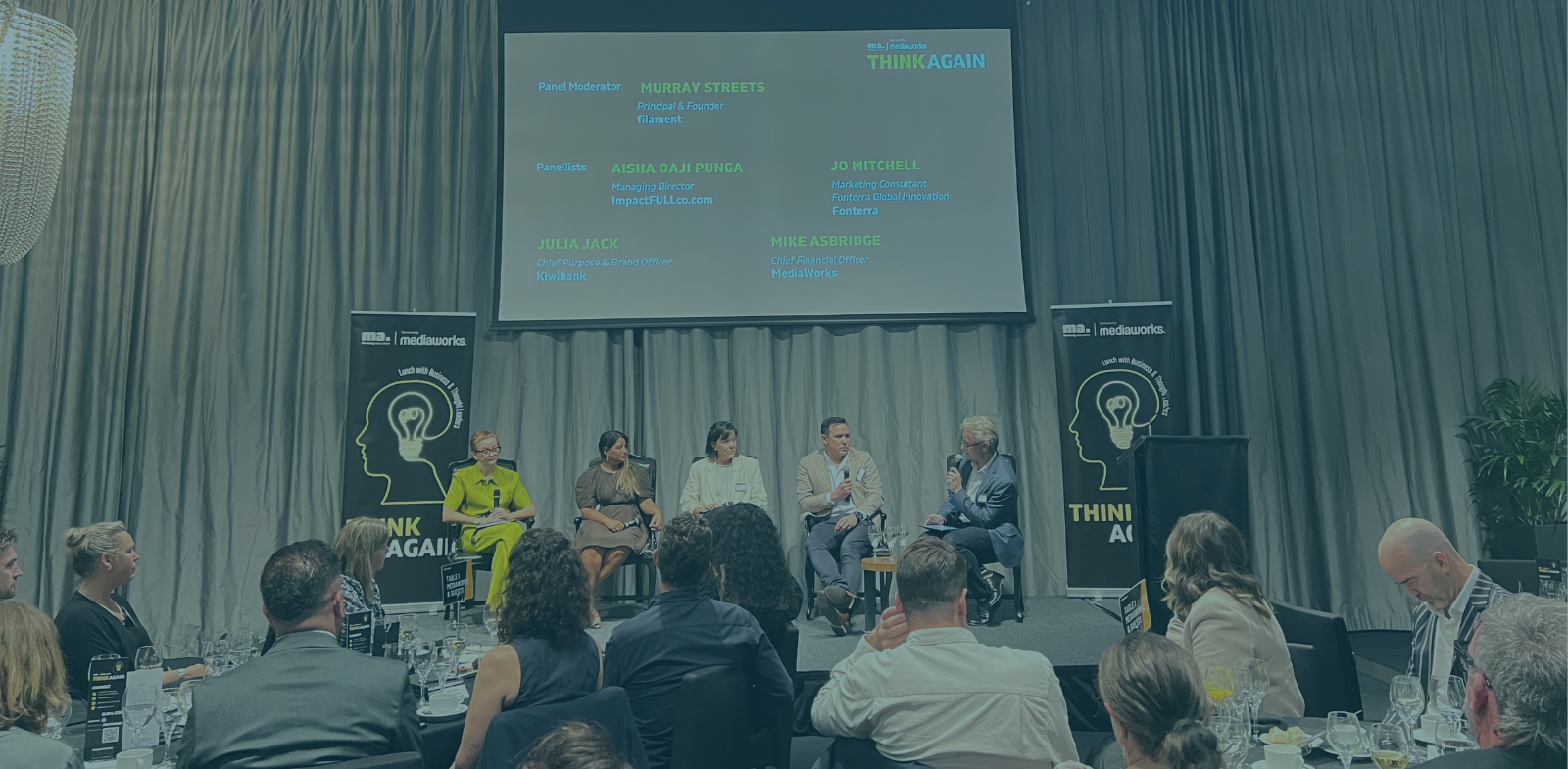
First Published: 12 March, 2024
To kick off the Marketing Association’s recent Think Again event at The Northern Club in Auckland, event moderator Murray Streets quoted the 19th century German Chancellor and diplomat who famously said, “Only a fool learns by experience, I prefer to learn from the experience of others.”
The Think Again events give senior marketers the opportunity to do the same – learn from the hard-earned experience of others, in this case a panel consisting of former Starship Foundation CEO Aisha Daji Punga, Julia Jack (Chief Brand and Purpose Officer at Kiwibank), Jo Mitchell (Marketing Consultant Fonterra Global Innovation), and Mediaworks’ CFO Mike Asbridge.
In the dynamic world of marketing, success often hinges on more than just creativity and strategy. It requires effective and authentic stakeholder management, especially when it comes to winning over the C-suite. At the recent Think Again event, we had a panel of senior leaders with diverse skillsets gathered to talk about the intricacies of engaging with top executives, and they shared what it takes to make friends with the C-suite.
Leading with integrity, responsibility, and compassion
Aisha Daji Punga kicked off the conversation by saying what she looks for in a CMO is the ability to be an organisational leader. To put the goals of the organisation first, above the functional goals of a marketing team. To be a compelling leader you must demonstrate character, and lead with integrity, responsibility, and compassion. Being successful in a leadership role means you need to inspire people, and she advised the group to self-reflect by asking, “do people like playing with you in a team? Not just to have fun with, but to have joint value creation with?” Never underestimate the power of emotional intelligence and being authentic!
Mike responded by reminding people that there are some harder realities in what a CFO expects. He encouraged people to involve finance in planning, and said they like to see marketing plans link back to the organisational strategy. And, no surprises here, but it’s always a bonus if there is visibility on the return on money that is invested. There also needs to be a clear view on the metrics you’re looking to impact, and how you’re looking to impact them.
Jo reminded us that marketing can talk in jargon a lot of the time, which wider teams may not understand. Be super clear, and super simple! Also, pre-align! No one likes surprises, share your thoughts before you get into the room with the C-suite and build alliances.
Forming genuine connections
Julia likened a scene from Finding Nemo to the relationship between CFOs and CMOs, “marketers are friends not food”. The relationship between a CFO and CMO is an important one, and one that needs fostering. CFOs don’t want to be known as the “budget police”, just like marketers don’t want to be known as the “brand police” or the “colouring in department”. CFOs understand commercial drivers – so get them involved, take them on the journey of your marketing strategy, and invest time in building relationships with them outside of executive meetings.
Julia went on to share her experience of transitioning from CMO to Chief Purpose & Brand Officer at Kiwibank, highlighting the evolving nature of her conversations with the C-suite. She emphasised the importance of forming genuine connections beyond transactional interactions, advocating for emotional engagement and a deeper understanding of individual stakeholders.
Lessons learned and some rookie mistakes
Throughout the discussion, panelists reflected on their own experiences and shared valuable lessons for marketers. They stressed the importance of authenticity, storytelling, and humility in navigating the complexities of stakeholder management. From admitting when they don't have all the answers to building alliances based on human connection here are some other key lessons and tips shared:
Aisha gave us some food for thought – when she was at the Starship Foundation, they didn’t have a marketing plan, but rather a cross-functional organisational plan. That meant that you couldn’t be successful, unless everyone was all successful, which helped align goals. Aisha isn’t an advocate of KPIs where it benefits only one person, and not the wider organisation.
This ties into what Mike recommended – that to protect the marketing budget, marketers need to use demonstratable value, and have a balanced portfolio of risk and return, working on a 70/30 principle.
At the end of the day, it’s simple really. The panel agreed that Marketing is the customer’s voice, that’s what marketing is all about and what senior marketers need to focus on. If your strategy aligns with what your customers want and need, and you can communicate that within the leadership team, then you’ll be on the right track.
Co-written by Danielle Chevriot, Marketing Manager, and Lone Tapp, Content Manager, Marketing Association.

Contact us if you have any suggestions on resources you would like to see more of, or if you have something you think would benefit our members.
Get in TouchSign up to receive updates on events, training and more from the MA.
